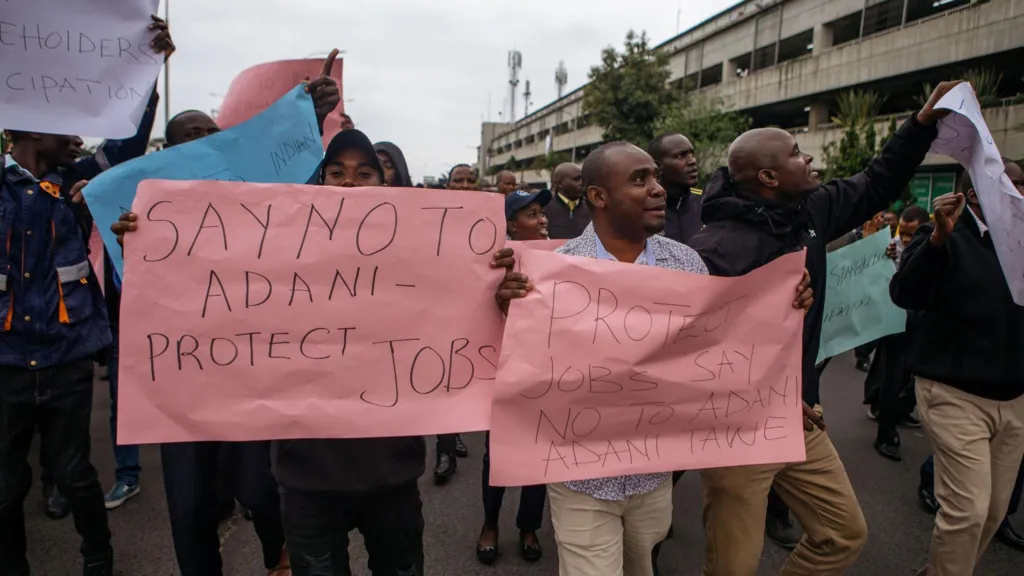
Kenya’s President William Ruto has announced the cancellation of two major deals involving Indian billionaire Gautam Adani’s business empire, the Adani Group, following allegations of fraud against the tycoon. In a speech delivered during his state-of-the-nation address on Thursday, President Ruto explained that the decision was made based on “new information provided by our investigative agencies and partner nations.”
The previous day, US prosecutors had indicted Adani, who is India’s second-richest individual, for orchestrating a $250 million fraud scheme. The allegations claimed that Adani concealed the scheme to illegally raise money in the US. The Adani Group has strongly denied these charges, describing them as “baseless.”
President Ruto, while addressing the Kenyan parliament, emphasized that his government would not tolerate corruption and would take “decisive action” if credible evidence emerged. His comments were met with strong support, with loud cheers from lawmakers in the assembly. “In the face of undisputed evidence or credible information on corruption, I will not hesitate to take decisive action,” Ruto declared.
The two deals that have been cancelled were among the largest investments Kenya had planned with the Adani Group. One of the contracts involved the group’s proposal to invest $1.85 billion in upgrading the Jomo Kenyatta International Airport, Kenya’s main airport. In exchange for this investment, Adani Group was set to run the airport for 30 years. This upgrade would have included the construction of a new runway and the enhancement of the airport’s passenger terminal. The second deal involved a $736 million project with Kenya’s Ministry of Energy, in which Adani Group was to construct power lines across the country.
Both agreements had sparked significant controversy within Kenya, with concerns raised over possible corruption and mismanagement. The airport deal, in particular, was met with fierce opposition from local workers. In September, a strike broke out at the airport as employees feared that the deal would lead to job losses and unfavorable working conditions. The workers argued that handing over management to a foreign company like Adani could negatively impact their livelihoods and lead to a loss of Kenyan control over the country’s infrastructure.
Energy Minister Opiyo Wandayi, however, defended the power line deal during a parliamentary committee meeting on Thursday. He asserted that there had been no bribery or corruption involved in the procurement process, attempting to ease concerns about the legitimacy of the deal. Despite his assurances, the broader public sentiment about Adani’s involvement in the country had already been soured by the allegations of corruption.
The cancellation of these deals comes at a time when President Ruto has made fighting corruption a key priority of his administration. Since taking office, Ruto has faced repeated allegations of corruption involving various government officials and contractors. The cancellation of the Adani Group’s deals signals his administration’s commitment to taking a hard stance on corruption, particularly when it involves foreign investments that could undermine public trust.
Following the cancellation, President Ruto announced that his government would begin searching for alternative partners for both the airport and energy projects. The decision has sparked mixed reactions across the country, with some supporting Ruto’s commitment to transparency, while others worry about the potential delays or complications in securing new deals.
While the Adani Group has maintained that the charges against Gautam Adani are unfounded, the impact of the fraud case and the subsequent cancellation of the deals with Kenya has already been felt. The group’s reputation, which has already been tainted by various allegations in the past, is likely to suffer further in the international business community.
In response to these developments, political analysts have suggested that this situation could have far-reaching implications for Kenya’s relations with foreign investors, especially in sectors like infrastructure and energy. The ongoing scrutiny of Adani’s business dealings in Kenya could make other foreign companies hesitant to engage with the country, fearing they might face similar challenges if their projects come under suspicion.
In the coming months, all eyes will be on how President Ruto’s administration navigates the fallout from this cancellation, particularly as the search for new partners begins. Will the government be able to attract reputable companies to invest in Kenya’s critical infrastructure, or will this controversy lead to a slowdown in foreign investment? Only time will tell, but it’s clear that the decision to cancel the Adani Group’s deals marks a significant shift in Kenya’s approach to foreign partnerships and anti-corruption efforts.






